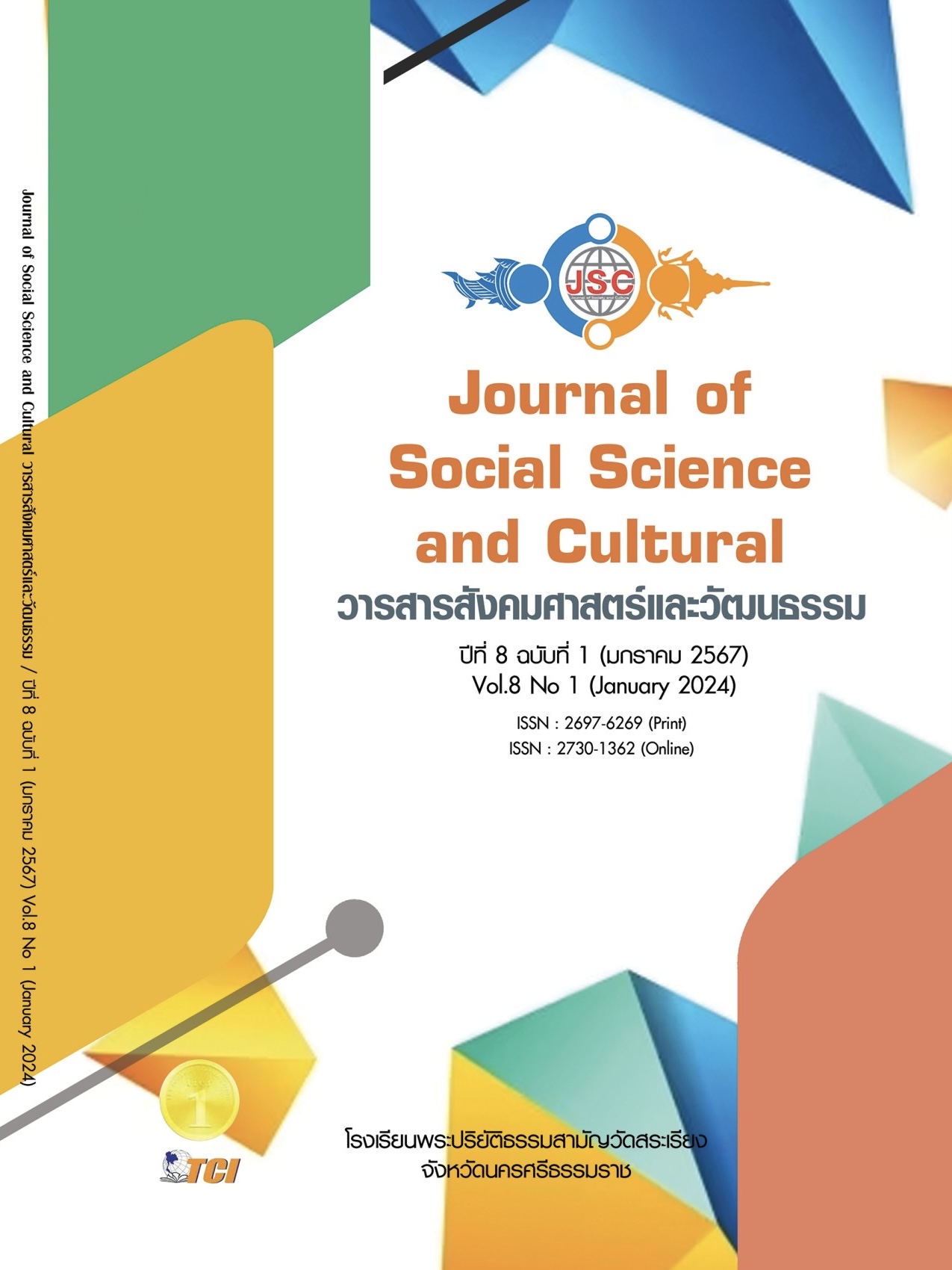EFFECT OF RECREATION PROGRAM ON LEADERSHIP SKILLS OF JUNIOR HIGH IN SRINAKHARINWIROT UNIVERSITY PRASARNMIT DEMONSTRATION SCHOOL (SECONDARY)
Main Article Content
Abstract
The objectives of this research article is to 1) investigating the leadership skills of junior high school students at Satit Prasarnmit Demonstration School (Secondary); 2) developing the leadership skills of junior high school students at Satit Prasarnmit Demonstration School (Secondary); and 3) comparing the outcomes of a experiential learning program that promotes leadership skills among junior high school students at Satit Prasarnmit Demonstration School (Secondary). By utilizing an experimental research design, specifically employing the repeated measures design, The research employed a purposive sampling method, specifically selecting 30 Grade Eight students. The research utilized a leadership development program designed to promote leadership skills among early secondary school students. Evaluation tools included an assessment of leadership skills and a questionnaire. The quality of the instruments was analyzed using the Index of Item Objective Congruence (IOC) formula of 0.86 - 1.00, and the reliability of the questionnaire was assessed using the Alpha-Coefficient formula according to Cronbach's method of 0.91. Collecting data by assessment of leadership skills before, during, and after the experiment. Data analysis involved calculating means, standard deviations, and the statistical analysis utilized a Repeated Measures Designs approach. The research findings indicated that, 1) Before participating in the leadership program, students possess intermediate-level skills in teamwork, communication, coordination, decision-making, and overall leadership skills. 2) After participating in the leadership program, students have enhanced their skills in teamwork, communication, coordination, decision-making, and overall leadership skills. And 3) There was a significant improvement in leadership skills during and after experimental intervention at a statistically significant level of .05.
Article Details
References
กรมสุขภาพจิต. (2563). ตามหาทักษะ ภาวะผู้นำที่ดี ในเด็กไทย. เรียกใช้เมื่อ 2 เมษายน 2564 จาก https://www.dmh.go.th/newsdmh/view.asp?id=30470
กิตติรานีย์ ขวงพร. (2559). การพัฒนาแบบวัดทักษะภาวะผู้นำการเปลี่ยนแปลงในคตวรรษที่ 21 ของนิสิตนักศึกษาระดับปริญญาบัณฑิต. วารสารอิเล็กทรอนิกส์ทางการศึกษา, 11(2), 131-146.
เกรียงศักดิ์ เจริญวงศ์ศักดิ์. (2550). ยุควิกฤตเด็กและเยาวชนขาดภาวะผู้นำ. เรียกใช้เมื่อ 2 เมษายน 2564 จาก http://www.kriengsak.com/node/49
จีรวัฒน์ วีรังกร. (2547). พื้นฐานทักษะการดำเนินกิจกรรมนิสิต. กรุงเทพมหานคร: พี.ที. พัฒนาการพิมพ์.
ฉวีวรรณ จันทร์เม่ง. (2552). ภาวะผู้นำการเปลี่ยนแปลงของผู้บริหารที่ส่งผลต่อมาตรฐานด้านผู้เรียนของสถานศึกษาขั้นพื้นฐานสังกัดสำนักงานพื้นที่การศึกษานครปฐมเขต 1. ใน วิทยานิพนธ์ศึกษาศาสตร์มหาบัณฑิต สาขาวิชาบริหารการศึกษา. มหาวิทยาลัยศิลปากร.
ชัยศาสตร์ คเชนทร์สุวรรณ. (2563). การพัฒนาภาวะผู้นำของนักเรียนระดับชั้นมัธยมศึกษา. วารสารบรรณศาสตร์ มศว, 13(1), 18-28.
นพดล นิ่มสุวรรณ และสุเมธ พรหมอินทร์. (2564). การพัฒนาทักษะด้านความร่วมมือ การทำงานเป็นทีม และภาวะผู้นําข้ามวัฒนธรรม ของเยาวชนในตำบลปากรอจังหวัดสงขลา. วารสารสังคมศาสตร์และมานุษยวิทยาเชิงพุทธ, 6(8), 73-86.
ปราณี อธิคมานนท์. (2550). ภาวะผู้นำของผู้บริหารสถานศึกษาที่ส่งผลต่อการดำเนินงานปฏิรูปการศึกษาสถานศึกษา สังกัดสำนักงานคณะกรรมการการศึกษาขั้นพื้นฐาน ในเขตภูมิภาคตะวันตก. ใน วิทยานิพนธ์ศึกษาศาสตรมหาบัณฑิต สาขาวิชาการบริหารการศึกษา. มหาวิทยาลัยศิลปากร.
รัตติกรณ์ จงวิศาล. (2543). ผลการฝึกอบรมภาวะผู้นำการเปลี่ยนแปลงของผู้นำนิสิตบัณฑิตวิทยาลัยมหาวิทยาลัยเกษตรศาสตร์. ใน วิทยานิพนธ์วิทยาศาสตรดุษฎีบัณฑิต สาขาวิชาวิจัยพฤติกรรมศาสตร์ประยุกต์. มหาวิทยาลัยศรีนครินทรวิโรฒ.
วรวุฒิ จิรสุจริตธรรม. (2553). การพัฒนาหลักสูตรเสริมเพื่อพัฒนาทักษะผู้นำเยาวชนในโรงเรียนอาชีวศึกษาคาทอลิก. ใน วิทยานิพนธ์การศึกษาดุษฎีบัณฑิต สาขาวิชาการบริหารการศึกษา. มหาวิทยาลัยศรีนครินทรวิโรฒ.
Parvathy, V. & Renjith, R. (2015). Impact of life skills education on Adolescents in rural school. International Journal of Advances Research, 3(2), 788-794.
Wingenbach, G. J. & Kahler, A. A. (1997). Self-perceived youth leadership life skills of lower FFA members. Agricultural Educator, 38(3), 18-27.


